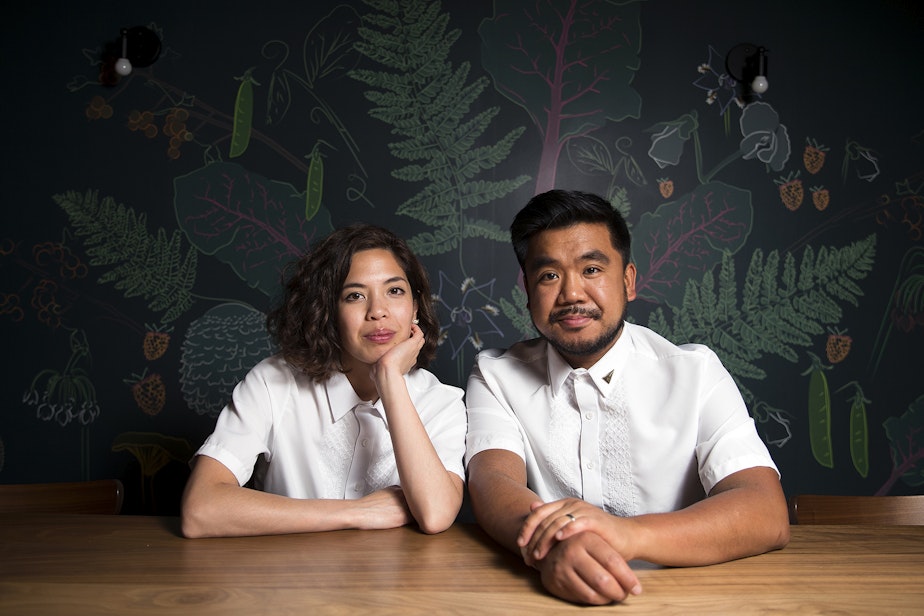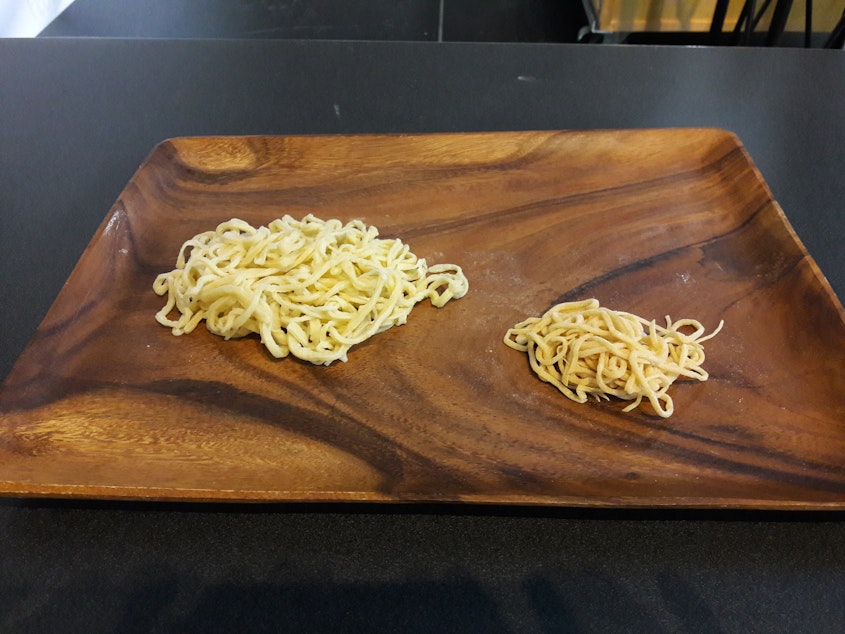This Seattle chef's food is a story of straddling two cultures

Aaron Verzosa and Amber Manuguid remember being embarrassed at school lunches because their food was different. But today, the couple showcase their Filipino heritage through their restaurant Archipelago.
Aaron Verzosa and Amber Manuguid were recently doing a food demo at the Seattle Center, as part of a festival celebrating Filipino culture. Verzosa is making fresh egg noodles called miki. While he cuts up the dough, Manuguid passes around a wood tray of just-made noodles to the audience. Verzosa tells the crowd the miki he’s making are thin, but where his grandfather came from, they’re thicker.
Filipino cuisine is as diverse as the 7,000 islands that make up the Southeast Asian archipelago. It has indigenous roots that usually involves cooking with what’s available in the environment. “That’s why you see a lot of things wrapped in bamboo, you see a lot of use of fire,” he explained.
There are also outside influences. “You have a tremendous amount of history of both China, Spain, U.S. more recently.”
At their restaurant Archipelago, Verzosa and Manuguid try to express the multi-faceted flavors of the Philippines, but by using ingredients from the Northwest. Manuguid explains this self-imposed limitation allows them to explore Filipino food in new ways.
“How can we create new dishes that still remind you of home,” said Manuguid, “and remind you of your parents, but are new and a way for us to be creative." Verzosa added it’s a way to express the region. “We’re born and raised in the Northwest; this is sort of why we place this sort of artificial limitation on where our ingredients come from.”
Sponsored
The result is food that represents their dual identities. Manuguid says they often get asked the same questions. “Are you Filipino? Are you Americans? We go to the Philippines pretty often and everywhere we go, oh Americans. And then here in the States it’s oh, Filipinos. So there’s this weird feeling of not belonging in either place.”

And rather than pick one or the other, they want to show the confluences of those cultures in every dish. For example, miki noodles are made fresh with Nash’s red wheat flour from Sequim. The noodles are lightly browned and served over a soft egg, with beef tapa--thinly sliced beef, or longanisa--Filipino sausage.
Both Verzosa and Manuguid grew up in families that love to cook. As a teenager in Vancouver, Washington, Verzosa remembers coming home from school and eating food that his dad prepared. “I’d be eating while watching people cook and my dad at some point was like, if you love to eat as much as you do, you need to learn to love to cook.”
Verzosa was planning to go to medical school. He took up cooking for fun, then decided to make it a career. After culinary training, Verzosa worked at Harvest Vine and Txori cooking Spanish food. For five years he was chef for research and development at Nathan Myhrvold’s Modernist Cuisine.
Sponsored
Last December Verzosa and Manuguid opened Archipelago in South Seattle, a tiny, intimate restaurant that seats only eight. While Verzosa cooks, Manuguid is what she calls the designer of experiences, taking care of the ambiance, the setting, and everything else in between.
But ultimately, Archipelago is about telling a story, of straddling two worlds. “It’s a big pillar of what we do,” said Verzosa, “ we try to understand identity from our personal perspective… this is our story. And we hope that there’s enough commonality and connection.”




